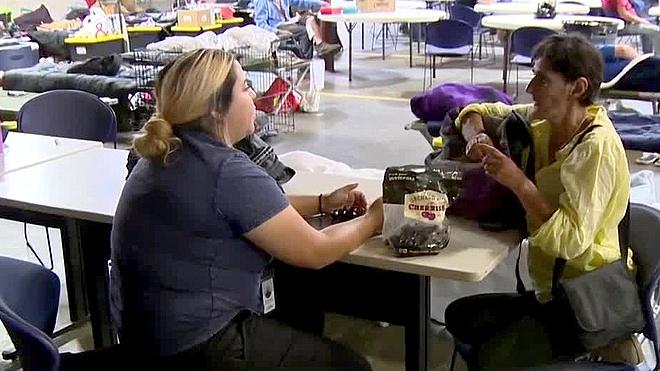Hope, Humanity & Housing: Sacramento program aims to get people off streets, into homes
Reporter Vicki Gonzalez spent the past year on this series as a recipient of the 2018 California Fellowship with USC Annenberg Center for Health Journalism.
Other stories in this series include:
Hope, Humanity & Housing: Terminally ill and living on Sacramento streets
Hope, Humanity & Housing: 69-year-old gets second chance after living on Sacramento streets
Hope, Humanity & Housing: Life on Sacramento streets
Hope, Humanity & Housing: Sacramento Mercy Pedalers deliver simple solutions

(Photo: KCRA 3)
SACRAMENTO, Calif. (KCRA) —
The city of Sacramento is trying a new approach to find housing for the most chronic individuals living on the streets.
“Three of our guests, at one time, had 120 years combined total,” said Ana Darzins with Volunteers of America.
A triage shelter opened in December 2017 in north Sacramento. As of August, the shelter has served more than 400 individuals -- 135 of which, or roughly a third, have been placed in permanent housing.
"Some of our most chronically homeless -- mentally ill, physically disabled, addicted individuals," Darzins said. "I see a lot of our friends that are 65 to, I think, our oldest is 88 years old. And, almost everyone in the building has a disability."
The VOA runs the triage shelter, which provides wrap-around social, mental, medical and VA services onsite in a rotating basis.
“For the first time we're allowing pets, we're allowing camping equipment and all the things that have prevented people from wanting to come in the shelter,” Mayor Darrell Steinberg said. "You actually say to people, 'Well, you know you can't use drugs onsite of course, or drink onsite, but we're going to take you as you are.'"
Cherie Bloom, 48, was living in an encampment on the American River levee for three years. A hit-and-run accident that nearly took her life led her to the triage shelter’s services.
"I tell people every day, 'Do you realize the opportunities you have here?'” Bloom said. "I don't want to be stuck out there forever. I don't want to be that one. I don't want to be that person."
The triage shelter is part of the city’s Whole Person Care pilot program, which is partially funded by a $64 million federal match grant. It kicked off this year and is still developing.
"I've got a Social Security card, which I haven't had in over 15 years. I go to a doctor. And, I am signed up for housing,” said Ms. Paula, who has been experiencing homelessness for 20 years. "I've been very happy. I owe them a lot."
The city said since Whole Person Care began, it has enrolled nearly 650 people. About 40 percent of them are now housed, either in shelters or in permanent housing, and 65 percent of them identified medical needs so complex that they require in-home care, palliative care or hospice care.
"From the bottom of my heart, I do appreciate that,” Bloom said. "Because you guys got me back to where I was."
ABOUT THE SERIES
Hope, Humanity & Housing is a four-part in-depth look at new solutions to the complicated and growing disparities of those struggling to find affordable housing in Sacramento.
[This story was originally published by KCRA 3.]

